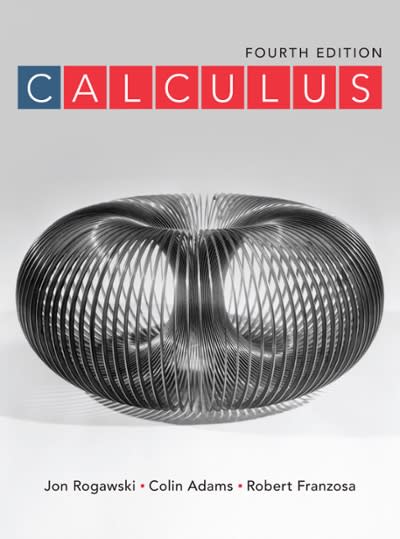Suppose that F (x) = (x) and G(x) = g(x). Is it true that y = F(x)G(x)
Question:
Suppose that F (x) = ƒ(x) and G(x) = g(x). Is it true that y = F(x)G(x) is an antiderivative of y = ƒ(x)g(x)? Confirm or provide a counterexample.
Fantastic news! We've Found the answer you've been seeking!
Step by Step Answer:
Answer rating: 33% (3 reviews)
Let fx x and gx x Then Fx x and gx xare antiderivativ...View the full answer

Answered By

Jonas Araujo
I have recently received the degree of PhD. In Physics by the Universidade Federal do Maranhão after spending a term in Durham University, as I have been awarded a scholarship from a Brazilian mobility program. During my PhD. I have performed research mainly in Theoretical Physics and published works in distinguished Journals (check my ORCID: https://orcid.org/0000-0002-4324-1184).
During my BSc. I have been awarded a scholarship to study for a year in the University of Evansville, where I have worked in detection-analysis of photon correlations in the the Photonics Laboratory. There I was a tutor in Electromagnetism, Classical Mechanics and Calculus for most of that year (2012).
I am very dedicated, honest and a fast learner, but most of all, I value a job well done.
5.00+
1+ Reviews
10+ Question Solved
Related Book For 

Question Posted:
Students also viewed these Mathematics questions
-
Suppose that f,g : [a,b] R. Decide which of the following statements are true and which are false. Prove the true ones and provide counterexamples for the false ones. a) If f and g are increasing on...
-
KYC's stock price can go up by 15 percent every year, or down by 10 percent. Both outcomes are equally likely. The risk free rate is 5 percent, and the current stock price of KYC is 100. (a) Price a...
-
Given that, VDD = 5V, VTN = 0.4 V, kn = 100 A/V, An = 0.02 V-, () = 80, R = 4 kN, R = 0.5 MN, R3 = 4.5 M, and assume that the current through R and R3 is negligible compared to IDs. 1) Find Vo. For...
-
A project costs $2.5 million up front and will generate cash flows in perpetuity of $240,000. The firms cost of capital is 9%. a. Calculate the projects NPV. b. Calculate the annual EVA in a typical...
-
About eight years ago, Kicker faced the problem of rapidly increasing costs associated with work-place accidents. The costs included the following: State unemployment insurance premiums...
-
11. For Figure 8, verify the following: a. The S&R index price at which the put option diagram intersects the x-axis is $924.32. b. The S&R index price at which the put option and forward contract...
-
In early 2017, for the first time, HTSM Corp. invested in the common shares of another Canadian company. It acquired 5,000 shares of Toronto Stock Exchange-traded Bayscape Ltd. at a cost of $68,750....
-
P 1 8 - 3 . Classification as Finance, Sales - Type, or Operating Lease, Lessee, Lessor, Journal Entries, Unguaran. teed Residual Value. Florida Energy Restoration, Ltd . ( FER ) enters into a lease...
-
State whether the following statement is true or false. If false, sketch the graph of a counterexample. (a) If f(x) > 0, then (b) If So f(x) dx > 0. f(x) dx > 0, then f(x) > 0.
-
Use the Change of Variables Formula to evaluate the definite integral. /6 Jo sec (2x - 7) dx
-
Why is the Modified Accelerated Cost Recovery System not generally accepted for financial accounting purposes? AppendixLO1
-
While sovling y' = Ky(Ay), we used the fact that 1 y(1) 1 1 - y y-A Use partial fraction decomposition (and a bit of algebra) to show that this is true. 1) Use partial fractions. Do not merely...
-
You are fluent in three languages. In terms of your strengths, this is an example of what? a. Personal brand b. Vocation c. Experience d. Competency
-
Miller Company's contribution format income statement for the most recent month is shown below: Sales (45,000 units) Variable expenses Contribution margin Fixed expenses Net operating income...
-
Find f''(x). f(x) = (x+8) 5 f''(x) =
-
How does the market play into business financials? 2- How do stocks and bonds play into the future of the organization? 3- What is the future value of money and what is it used for? 4- What is a...
-
Mamosa Corporation has been using the FIFO cost flow method during a prolonged period of inflation. During tile same time period, Mamosa has been paying out all of its net income as dividends. What...
-
Provide a few individual examples who revealed what aspects of emotional intelligence?
-
State whether each of the following is an odd function, an even function, or neither. Prove your statements. (a) The sum of two even functions (b) The sum of two odd functions (c) The product of two...
-
Let F be any function whose domain contains - x when-ever it contains x. Prove each of the following. (a) F(x) - F (- x) is an odd function. (b) F(x) + F(- x) is an even function. (c) F can always be...
-
Is every polynomial of even degree an even function? Is every polynomial of odd degree an odd function? Explain.
-
1. Determine the value of the right to use asset and lease liability at commencement of the lease.
-
Problem 22-1 The management of Sunland Instrument Company had concluded, with the concurrence of its independent auditors, that results of operations would be more fairly presented if Sunland changed...
-
Question 4. - Week 9. What are the major competitive issues General Electric faces when managing cooperative strategies? - (7 marks)

Study smarter with the SolutionInn App


